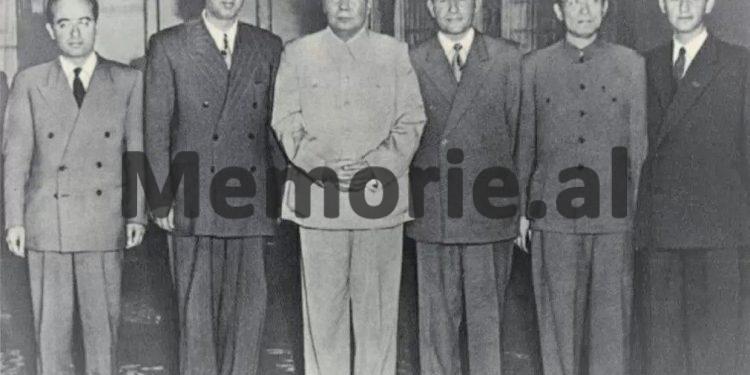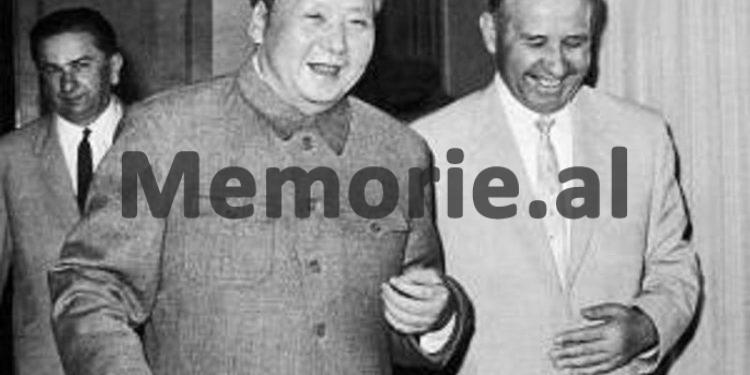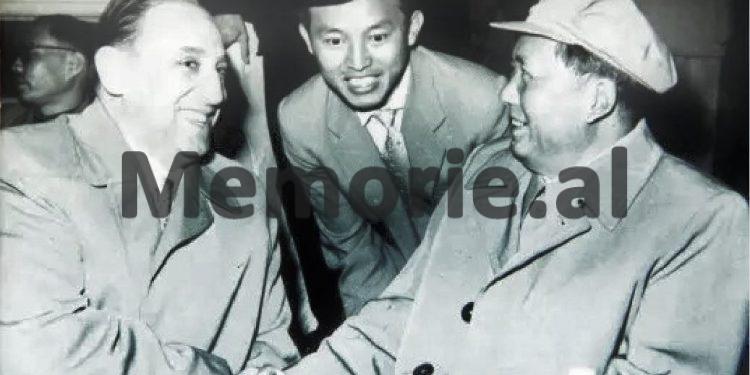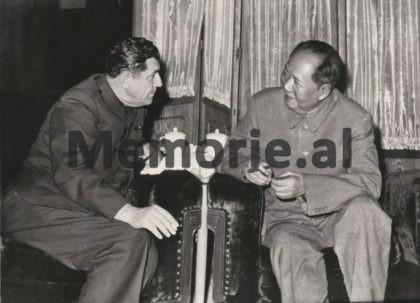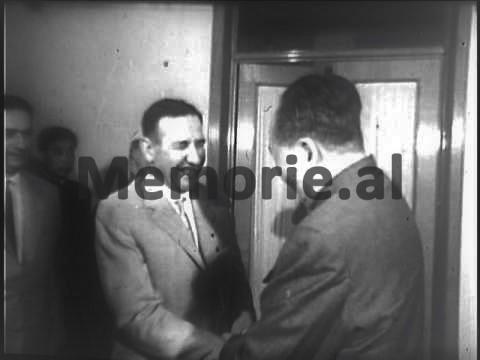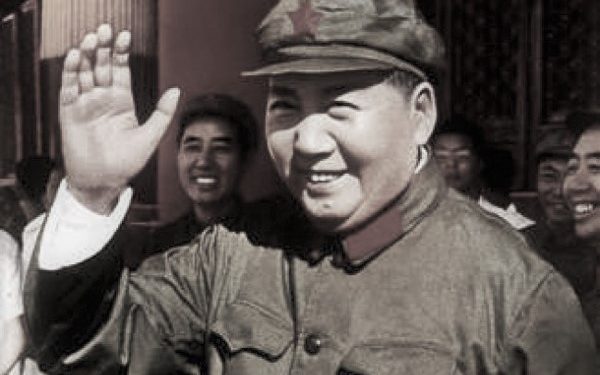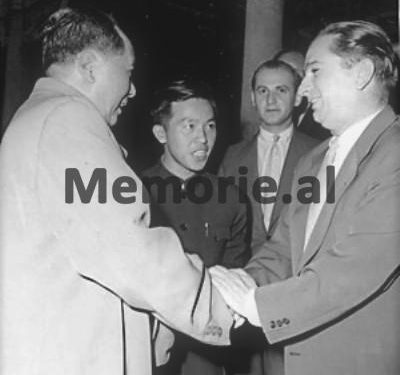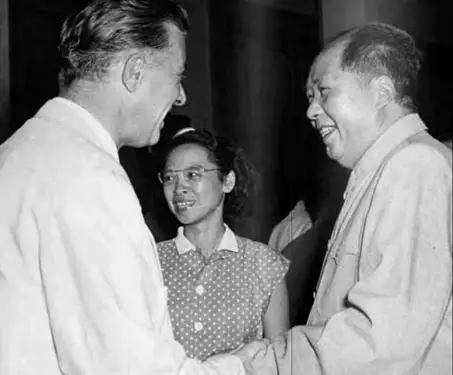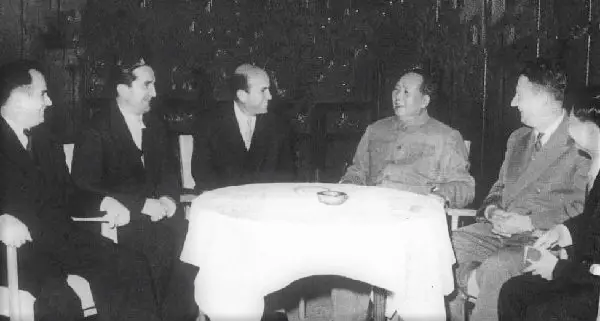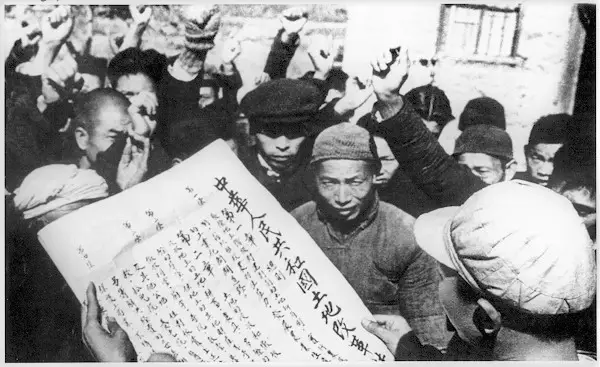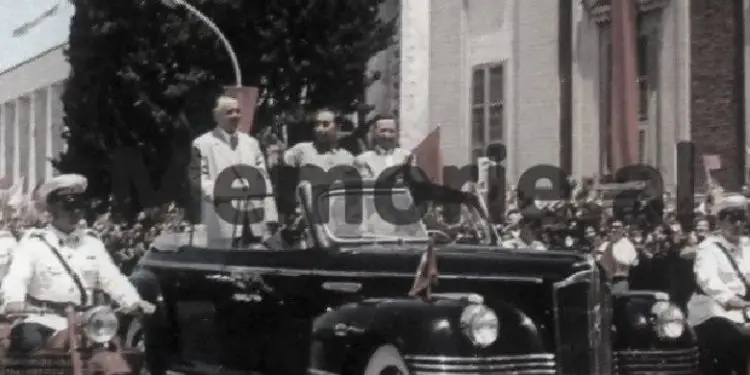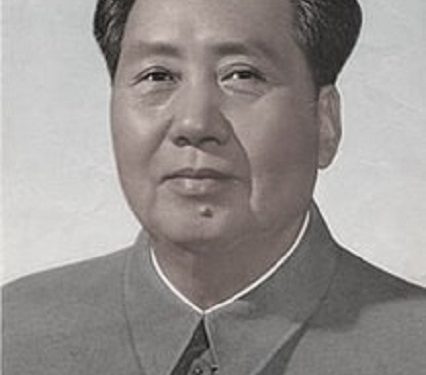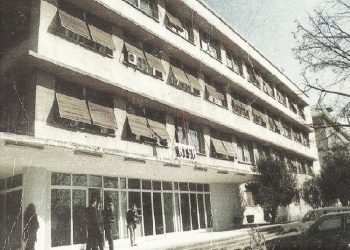Dashnor Kaloçi
The first part
Memorie.al/ publishes an archival document issued by the Central State Archive in Tirana (fund of the former Central Committee of the ALP), which belonged to 1967, where is the minutes “Top secret” of a conversation held in Beijing on February 3 of that year, during a reception that the Chairman of the Communist Party of the People’s Republic of China, Mao Zedong with Prime Minister Chu En Lai, gave in honor of the Albanian delegation led by the Secretary of the Central Committee of the ALP- Hysni Kapo and the Minister of National Defense and Deputy Prime Minister Beqir Balluku, attended by the Minister of Foreign Affairs, Behar Shtylla, the Director of the Political Directorate of the Army in the Ministry of Defense, Hito Çako, and the Albanian Ambassador to Beijing, Vasil Nathanaili. The full conversation between the two main leaders of the People’s Republic of China with the high Albanian delegation, where Mao Zedong after making a general summary of the real situation in which China was at that time and the Communist Party he headed, he told Hysni Kapos and Beqir Balluku, that: the propaganda made by the top Chinese leadership and the newspaper ‘Zhenminzhibao’ that described him as: “Great Teacher”, “Great Leader”, “Great Strategist” and “Great Steering Wheel”, are raised the cult of the individual, which he did not like, as he wanted to be called simply a “teacher”, as he had actually been, but could do nothing to stop it!
Minutes of the conversation held in Beijing on February 3, 1967, during the reception given by Mao Zedong to the Albanian delegation, led by Hysni Kapo and Beqir Balluku
Top secret
Summary of the conversation between President Mao Zedong and comrades Hysni Kapo and Beqir Balluku. (According to an unverified transcript).
Meeting time: February 3, 1967, starting from 5:20 pm to 7:00 pm
Meeting place: Room no. 118, Assembly Hall
Participants: Behar Shtylla, Hito Çako, and Vasil Nathanaili
Translator: Fan Tzen Xuo
Before the conversation, Comrade Mao Ce Dun greeted Comrades Hysni Kapo, Beqir Balluku, Behar Shtylla, Hito Çako and other members of the Albanian military delegation, led by Comrades Hysni Kapo and Hito Çako.
Comrade Mao Zedong warmly greeted his Albanian comrades and shook hands strongly. Albanian comrades greeted Comrade Mao Zedong with applause and cheers. While photographs were being taken, Comrade Mao told his comrades that they should be caught smiling, that they should appear full of life in pictures, not dead – that the proletariat should appear full of living pictures.
After the photos were taken, Comrade Mao Zedong shouted: Down with imperialism! Down with revisionism! Down with the reactionaries of all countries! Let’s join! Let us unite all the revolutionary people of the world!
Comrade Mao Zedong asked comrades Hysni Kapo, Beqir Balluku and others to convey the most cordial greetings to Comrade Enver Hoxha, Comrade Mehmet Shehu and other leaders of the Central Committee of the Albanian Labor Party.
Comrade Mao Zedong asked with great interest Comrade Hysni Kapo about his health and looked intently at both hands of Comrade Hysni Kapo.
After that, comrade Mao Ce Dun had a really cordial and sincere conversation with comrades Hysni Kapo, Beqir Balluku, Behar Shtylla, Hito Çako, and others.
Chairman Mao: When are you going to leave?
Comrade Beqir Balluku: Comrade Hysni will leave the day after tomorrow.
Chairman Mao: We think we should keep you here for three months (to Comrade Hysni). We would like you to help us, give us advice, but you will leave us. Sorry about that; we can not keep you here.
Comrade Hysni Kapo: Comrade Mao Zedong, even before the delegation led by Comrade Beqir Balluku and we, Comrade Enver and the Central Committee, asked us to communicate with the Chinese people, friends and especially with you, Comrade Mao Zedong, to We convey the greetings of the Albanian people and the Albanian Labor Party, led by Comrade Enver Hoxha, so that you can live as long as the mountains of Albania, for the good of the Chinese people, for the benefit of people all over the world, for the good humanity!
Chairman Mao: Thank you very much.
Comrade Hysni: Furthermore, our Central Committee, and especially Comrade Enver, has asked me to convey our heartfelt thanks for your personal message at the Fifth Congress of the Albanian Labor Party, brought to us by Comrade Kang Sheng. This message is of tremendous importance in the history of our party and our people.
It serves to inspire our party and people, led by Comrade Enver Hoxha, in the struggle to defend Marxism-Leninism, in the victory of socialism and communism. I want to reiterate this fact – this message is very important; a great lesson for us, an inspiration in fulfilling our obligations.
We carried this message to the farthest corners of our country; men, women, the elderly and the young should listen to it. This message is a great inspiration in the ongoing war in our country. This message gave us strength. We will continue our struggle under the leadership of our Party and Comrade Enver Hoxha.
Chairman Mao: Does it really play such a big role? It does not really play such a big role; how can that be ?! You have exaggerated this. I think you are promoting the cult of the individual.
Comrade Hysni: No. We are not afraid of the cult of the individual, Comrade Mao Zedong. As for the party and our people, that is a fact.
Comrade Beqir: Thank you very much for the high appreciation and support you showed us.
Chairman Mao: I’m not very skilled and you know that, comrades. Just look at what a mess China is in. Things are not going well. There is great confusion everywhere. When was comrade Mehmet Shehu here in China?
Comrade Chu En Lai: In May last year.
Chairman Mao: In May last year, I told him that the question, whether revisionism will succeed, or whether it will be Marxism-Leninism, is the question of two paths and two classes. Who will win? Will it be the bourgeoisie or the proletariat? Marxism-Leninism or revisionism? I told him we could not say yet; we still cannot draw any conclusions as to who will win.
There are two possibilities: The first is for the bourgeoisie to emerge victorious, for revisionism to triumph. The second possibility is to overthrow revisionism and the bourgeoisie. Why did I first mention the possibility of our loss? I believe it is more favorable for us to look at things this way. This means that we should not underestimate the enemy.
The war within our party has remained hidden for many years. For example, in January 1962, we convened an extensive meeting attended by more than 7,000 of our cadres, including party secretaries from the district level and up. I gave a speech at this meeting. I said that the revisionists wanted to overthrow us and if we did not pay attention to it, if we did not fight, then in at least a few years, or maybe ten, and at most in a few decades, China would become a fascist dictatorship.
This speech was not published; was kept as an internal document. We will look at it again because there may be some things out there that need to be corrected. However, already at that time I pointed out this issue. Five years passed – 1962, 1963, 1964, 1965, 1966. Why did we fail to perform some of our tasks correctly? This is not a matter of modesty; these are true words. In the past, we only focused on certain issues and certain people, such as, for example, over the past 17 years, the fight against the Kao Kang and Jao Shu-Shih group, which we overthrew. This happened in the winter of 1953 and in the spring of 1954.
Then, in 1959, we overthrew the group of Peng Dehuai, Huang Kecheng and Zhang Wentian. In addition to these, we waged a war in cultural circles, in villages and in factories – this was the campaign for socialist education. You know some of these things. All of this really can’t solve the problem; we have not found a way, a method to reveal our darker side in an open and inclusive way, from the bottom up.
We needed a period of preparation for this war. Two years ago, in November, we published a critical article against a historian, Wu Han. It was impossible for this article to be written in Beijing; we could not organize a group of writers there, so the group was organized in shanghai, including Yao Wenyuan and other friends, and that is why they wrote this article.
Comrade Hysni: According to the instructions of Comrade Mao Zedong.
Chairman Mao: I do not know how involved Jiang Qing and others were when they started writing this. After they finished it, they gave it to me to read. At first, they told me it was necessary to come up with some criticism. I also did not know about the fact that they could not organize the group of writers in Beijing, that is why they went to Shanghai.
So after preparing the article, they gave it to me to read. They said to me: We are giving only to you, but we are not giving to Chu En Lait and Kang Sheng and others, because if we give to them, then we should also give to Liu Shaoqi, Ten Hsiao Pin, Peng Zhen, Lu Dingyi, and so on. Liu Shaoqi and Ten Hsiao Pin and others, were against the publication of this article.
After the article was published, with the exception of Beijing, newspapers in the provinces republished it. I was in Shanghai at the time, and later, I said the article should also be published in brochures. All the provinces claimed they would agree to it, except Beijing. Because some people were not sure! The party committee in Beijing was in such a state that it was completely impenetrable – you could not even get the tip of a needle or a drop of water there.
Wasn’t it reorganized? Even the party reorganization committee was not in order, so reorganization is needed again. When the reorganization of the party committee in Beijing was publicly announced, we added two divisions to the Beijing garrison. There are three territorial divisions now in Beijing and one motorized division, ie four divisions in total. Therefore, you and I can go wherever we want to go. The first two divisions are good, but they were very scattered; they dealt with defense everywhere.
Among the ‘Red Guards’ there are incredible people: monarchists who are quiet during the day but take action at night. They hold cups and masks and are armed with sticks and knives. They have caused disorder and tried to kill a number of good people. They have killed several and injured several hundred. Most of the perpetrators of these types of crimes are children of high-ranking cadres, for example: the children of The Long, Lu Dingyi, Luo Ruiqing and others. This is also the reason why there are problems in the army.
He Long is a member of the Politburo, while Luo Ruiqing is a member of the Secretariat and Chief of General Staff. We resolved the Luo Ruiqing case two years ago, in December. We resolved the case of the people on the Beijing party committee in May last year. We ran the dazibao (Lightning Leaflet, Our Note) campaign, starting June 1 last year. Starting in August, we activated the Red Guard. Some of you, friends, met Nie Yuanzi at Peking University. Who was in the meeting?
Comrade Hysni: Comrade Behar Shtylla.
Chairman Mao: She wrote a dazibao on May 25 last year. I was in Hangzhou at the time and only read it around noon on June 1st. I read it and immediately called Kang Sheng and Chen Boda, and told them to broadcast it on the radio. Soon after, dazibaot appeared everywhere!
Comrade Beqir: Dazibaot gave the signal.
Chairman Mao: I did not write it; was written by Nie Yuanzi and six other friends. The Red Guards were organized in schools near Tsinghua University and Peking University. They sent me a document. I wrote to the Red Guards of these two schools on June 1, and as a result, the Red Guards expanded vigorously throughout the country. On August 18, I held a meeting with several hundred thousand Red Guards. The 11th Plenum of the Central Committee was held from the first ten days until mid-August.
At that time, I myself wrote a dazibao with about 200 paragraphs, which pointed out that some important people, starting from the base to the Central Committee, acting from the bourgeois point of view, were fighting against students and pupils, against the proletariat, and that they were committing white terror. This is how we unmasked the activity of Liu Shaoqi and Ten Hsiao Pin. But the final confrontation between the two sides is not over yet. More or less, the months of February, March and April, will be the appointed time, which will determine victory or defeat.
As for the complete solution of the problem, we need by February, March and April of next year, and maybe even longer than that. Do not think that all members of our party are good people. Already a few years ago, I said we needed to clean up a few million of them. Were these perhaps empty words? There is nothing you can do! Solving the problem required mass mobilization, but the masses could do nothing.
They do not understand. ‘Zhenminzhibao’, the Central Committee newspaper, does not listen to me. In the newspaper, they took over twice: once on June 1 last year, and then again in January. I have publicly stated that I will not read ‘Zhenminzhibao’. I said this to the editor-in-chief there: I will not read your newspaper! I said this a few times, but he did not listen to me.
These thoughts of mine do not go well here in China; they do not admit them to universities and high schools because they were controlled by Liu Shaoqi, Ten Hsiao Pin, Lu Dingyi’s Propaganda Department, Zhou Yang’s Ministry of Culture, and everyone else in the Ministry of Higher Education and in general education. There is nothing one can do.
Many people have been unmasked in our party, and these can be distinguished by several types: The first type consists of those who want a democratic revolution, so we can cooperate with these people during the phase of the democratic revolution. They want to achieve a democratic revolution and the creation of capitalism.
They want the overthrow of imperialism and feudalism, and also they want the overthrow of bureaucratic capitalism. But in reality, they do not want the overthrow of national capitalism. They agree on the distribution of land, that this land be given to the villagers, but they do not agree with the establishment of cooperative farms. This type of people consists of a group of so-called old cadres.
The second type consists of people who joined the party after liberation; 80 percent of these people joined the party after 1949. Some of these people became cadres, secretaries of the party’s territorial organizations, secretaries of the party committees, and even party secretaries at the district level, at the regional level, at the provincial level. even some members of the Central Committee. Here are these people.
The third type consists of those people we inherited from Guomintang. Some of these were communists captured by Guomintang, and who became traitors and made anti-communist statements in the newspapers. At the time, we did not know they were anti-communists. We did not know what kind of “official arrangements” they had made. Now, after looking at these things, it turns out that they were with Guomintang and against the Communist Party.
The fourth type consists of the children of the bourgeoisie, the feudal lords, the kulaks. After liberation, they entered schools, even universities, and gained some power. These people are not all bad; some of them are on our side, but some of them are counter-revolutionary.
So, more or less, these people fall into these categories. In short, they do not make up a large part of the population in China, only a few percent of it. Their class base consists of only a few percent of feudal lords, kulaks, capitalists, guomintangists, and so on.
They are, at most, five percent. Thus, out of 700 million inhabitants, these people make up no more than 35 million. They are scattered in villages, towns and neighborhoods. If 35 million people were to gather in one place and take up arms, then they would make a great army.
Comrade Beqir: Even if they were to gather, they would constitute an army that had no idea.
Chairman Mao: They are a class that is disappearing. Of these, more than 30 million people, their representatives consist of no more than hundreds of thousands and they are scattered in various cities, neighborhoods, villages, schools and institutions. That is why as soon as dazibao appeared, as soon as the mass movement started, as soon as the Red Guard came out, they were scared to death.
In addition, there were some other irregularities. They started using and abusing the expression “Mao Zedong Thought”, “Maoism” … I do not like this “-ism”.
Chu En Lai: We say that the phrase “Mao Zedong Thought” will continue to be used in the future.
Chairman Mao: They have also attached me some epithets, like “Great Teacher”, “Great Leader”, “Great Strategist” and “Great Steering Wheel”. I do not like these. But I can do nothing. They are doing this everywhere. Some people propose to simply preserve the epithet “Teacher”. I was a teacher in an elementary school – how good it is to be just a simple teacher! But in terms of being a “professor”, this is not discussed. I did not attend university. Have you attended any universities?
Comrade Hysni: None.
Chairman Mao: What about you? (Addressing comrade Beqir Balluku)
Comrade Beqir: I do not have either.
Chairman Mao: Neither do you? (addressing comrade Hysni Kapo)
Comrade Hysni: I only attended high school.
Chairman Mao: Marx attended university, and Lenin. Stalin finished high school, just like me. I am skeptical of a good portion of university students, especially those who have studied social sciences. If these people are not educated, if there is no cultural revolution, then they become very dangerous. They become revisionists further. Those who have studied literature, cannot write their own novels and poems.
Those who have studied philosophy cannot write philosophical articles nor can they explain social phenomena. The political and legal studies they have undertaken are entirely the product of the bourgeoisie. We do not yet have a suitable textbook. Those who have studied economics, also fall under this. There are many revisionist elements. But we are again hopeful now that this brutal war is going on.
Comrade Beqir: It is brutal, but it is good. It is good to carry out such cleaning.
Comrade Hysni: Once people are mobilized, everyone can be cleansed. Perhaps what we have seen so far is very limited, but these are our impressions: the whole Chinese people have risen to their feet.
Chairman Mao: Not everyone, not yet.
Comrade Hysni: From what we have seen, the whole Chinese people have risen with the Great Cultural Revolution, in the fight against internal enemies, to move forward in building socialism, defending the socialist revolution and strengthening the dictatorship of the proletariat. We are very enthusiastic. We may not have seen enough, but we are optimistic. /Memorie.al
The next issue follows




